#more fossil fuel lobbyists
Explore tagged Tumblr posts
Text
The number of fossil fuel and petrochemical industry lobbyists has increased by more than a third at UN talks to agree the first global treaty to cut plastic pollution, analysis shows. Most plastic is made from fossil fuels via a chemical process known as cracking, and 196 lobbyists from both industries are at the UN talks in Ottawa, Canada, where countries are attempting to come to an agreement to curb plastic production as part of a treaty to cut global plastic waste, according to analysis by the Center for International Environmental Law (Ciel). The 196 lobbyists registered for the talks represent a 37% increase from the 143 lobbyists registered at the last talks, in Nairobi. This in turn was a 36% increase on the previous year’s number. Increased plastic production is a major part of the fossil fuel industry’s plans for the future, and any attempts to curb production, such as those being discussed at the UN talks, are an obvious threat to their profits. According to Carbon Tracker, BP expects plastics to represent 95% of net growth in oil demand from 2020 to 2040, and the International Energy Agency estimates plastic demand will make up 45% of growth for oil and gas mining to 2040. Fossil fuel and chemical industry lobbyists are also gaining greater access to sessions with member states to push their agenda, according to Ciel. They outnumber the delegates from the European Union, and there are three times more fossil fuel and chemical industry lobbyists than independent scientists from the Scientists’ Coalition for an Effective Plastic Treaty.
continue reading
#canada#un ottawa plastic pollution intergovernmental negotiating committee#more fossil fuel lobbyists#plastic pollution#environment#health#capitalism
10 notes
·
View notes
Text
“Just don’t read/play/watch it if you don’t like it.”
My brother in Christ, I have to experience the thing to conclude that I didn’t like it in the first place.
#in my mind it’s more like ‘don’t shit on someone else’s good time’#it’s the reason I don’t tag my negative thoughts; they stay here on my blog and away from people havin a good time#and the WORST ones only get shared with friends#and we don’t Hate Watch in this house either#I have a limited amount of time and energy and I’d prefer to bite Republicans and fossil fuel lobbyists instead
5 notes
·
View notes
Text
THIS THIS THIS THIS THIS.
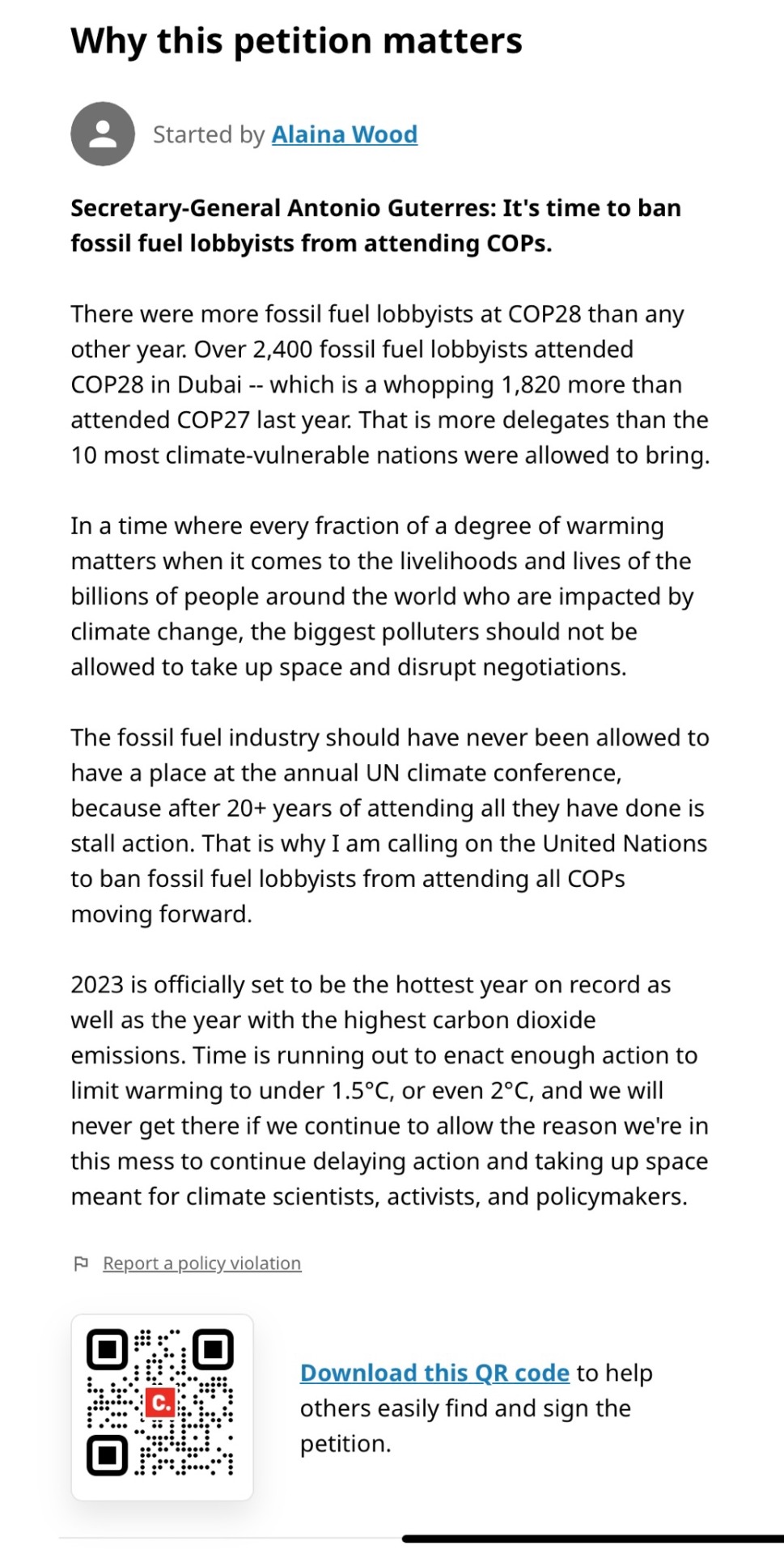
Please sign the petition if you can!!
(Here’s the link to Alaina’s linktree which provides additional links to other important causes.)
#no more cop outs#Alaina Wood#COP28#climate change#polluter pays principle#science#ecology#environmental science#nature#fossil fuels#fossil fuel lobbyists#1.5 degrees#2 degrees#UN climate conference#hottest hear in record#carbon dioxide#eco anxiety#eco activism
1 note
·
View note
Text
By Jake Johnson
Common Dreams
Oct. 24, 2024
"Every vote for Dr. Jill Stein or Cornel West instead of Kamala Harris makes it more likely that Donald Trump will win," wrote a coalition of leading environmental groups.
A coalition of leading U.S. environmental groups warned Thursday that a third-party vote in next month's election could help usher in climate disaster by improving Republican nominee Donald Trump's chances of victory, a risk they said the planet can't afford as time runs out to avert catastrophic warming.
Voting for Vice President Kamala Harris and her running mate, Minnesota Gov. Tim Walz, in the November 5 election is imperative because they represent "our best chance at making more progress over the next four years," 350 Action, the Center for Biological Diversity Action Fund, Climate Emergency Action, Earthjustice Action, Food and Water Action, Friends of the Earth Action, and other climate groups wrote in an open letter addressed to "potential supporters of Jill Stein or Cornel West."
While the letter thanks Stein, the Green Party candidate, and West, who is running as an Independent, "for raising important issues in this election," the groups argued that Harris "is the only candidate with a record of success addressing climate change," pointing to her tie-breaking vote in support of the Inflation Reduction Act and legal action against oil companies during her tenure as California's attorney general.
Trump, by contrast, "waged the worst White House attack ever against the environment and public health while in office," the groups wrote.
One analysis estimates that a second Trump presidency could result in an additional 4 billion tonnes of carbon dioxide equivalent emissions by 2030, negating recent progress in renewable energy development and inflicting large-scale climate damage. Fossil fuel industry attorneys and lobbyists are already drawing up executive orders for Trump to sign should he prevail on November 5.
"He has made clear that his second term will be even more extreme, drawing from the detailed anti-environment proposals and plans contained in Project 2025," the climate coalition wrote in the open letter. "Every vote for Dr. Jill Stein or Cornel West instead of Kamala Harris makes it more likely that Donald Trump will win."
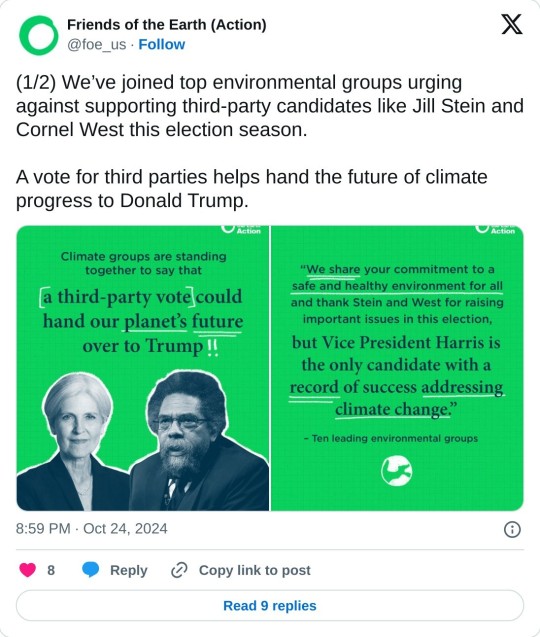
In a separate social media thread on Thursday, the youth-led Sunrise Movement—a signatory of the new open letter—wrote that "this election will decide the temperature on our planet for thousands of years."
"It will decide if we have a fighting chance to stop the climate crisis or not," the group added. "Voting alone or voting third party won't save us. Let's be honest—financing a genocide, competing on who can be crueler to immigrants, or thumbs-upping fracking is fucked. A Harris presidency won't stop violence. No president ever will."
"But neither will disengaging or throwing away our votes. This election might not save the world but it will set the scene," said Sunrise, which has been working to mobilize young voters in swing states to back Harris. "We have six years to stop the climate crisis and we can't afford to give four of them away to Trump. What your summers look like in 2047, where your family might live in 2063, whether tens of millions of more people become climate refugees or not will be deeply impacted by the election results."
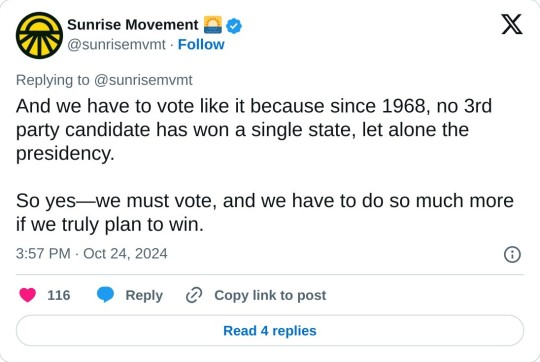
Tens of millions of ballots have already been cast in dozens of states across the U.S. ahead of Election Day, with officials reporting record turnout in battlegrounds such as Michigan and Georgia.
Stein and West are among several third-party candidates on the ballot in critical states that could decide the presidential contest. Recent polling has shown that Stein and West are both polling around 1% in the key state of Michigan, where Harris and Trump are in a dead heat.
Michigan has received significant attention this election cycle given that it was the birthplace of the Uncommitted National Movement, which began as a primary campaign effort to push President Joe Biden to halt U.S. support for Israel's assault on the Gaza Strip.
The movement has since shifted its focus to pressuring Harris to back an arms embargo against Israel, something she has declined to do. While Uncommitted opted against endorsing Harris last month, it said it opposes the Republican nominee and warned that "third-party votes in key swing states could help inadvertently deliver a Trump presidency given our country's broken Electoral College system."
"We are going to be voting for the world's climate future even if we are reluctant to admit it."
Stein has dismissed the notion that she's a potential "spoiler" candidate, arguing her supporters would likely opt to stay home instead of vote for Harris or Trump if there was no third-party choice.
But speaking in Michigan earlier this month, Stein supporter Kshama Sawant—a former member of the Seattle City Council—acknowledged that "we are not in a position to win the White House" and said she views the Green Party candidacy as an opportunity to "deny Kamala Harris the state of Michigan."
"And the polls show that most likely Harris cannot win the election without Michigan," Sawant added.
That approach could be devastating for the planet, progressive lawmakers and climate advocates have argued.
"If Donald Trump is elected, the struggle against climate change is over," Sen. Bernie Sanders (I-Vt.) wrote in a social media post on Thursday. "The United States will withdraw from the movement toward sustainable energy."
Kumar Venkat, a carbon footprint analyst, wrote in an op-ed for Common Dreams on Friday that "if elected, it is reasonable to expect that Harris will build on the Biden administration's work and keep the U.S. on the net-zero path."
"Donald Trump has made it exceedingly clear that he does not believe climate change is even a problem," Venkat wrote. "Between Project 2025 pushing for a 'whole-of-government unwinding' of U.S. climate policy and the fossil fuel industry drafting detailed plans to dismantle the Biden administration's climate rules, it is a safe bet that we will no longer be on a trajectory to net-zero emissions if Trump is back in the White House."
"We are going to be voting for the world's climate future," he added, "even if we are reluctant to admit it."
Our work is licensed under Creative Commons (CC BY-NC-ND 3.0). Feel free to republish and share widely.
#2024 u.s. presidential election#voting third party#climate emergency#climate change#green party#jill stein
342 notes
·
View notes
Text
About Blowing Up Pipelines
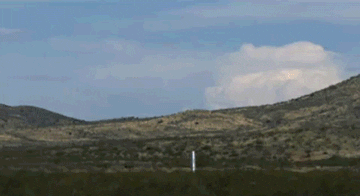
A while ago I saw a post about fossil fuels, under which someone posted: "What are you waiting for? Let's blow up the pipelines!" Which is very fair. But someone else came to post under it: "No! Think of the environmental harm! You need to go vote!"
And, let's be honest here: It is very likely that neither of them have actually read the book that the "blow up a pipeline" wording comes from. How to Blow up a Pipeline by Andreas Malm. Which in its core argues that sabotage is good, because voting doesn't do shit.
Now, don't get me wrong. There is a ton of important elections coming up - especially in the US, but soon in Germany as well. And you need to go vote to prevent another Trump presedency! However: There is nobody you can vote for, who will actually stop pipelines from being build, who will actually limit the size of cars folks drive, and who will actually put pressure on natural gas, coal and what not. Heck, even in the best case that on a local level there might be some who want to build out bike lanes and public transport... Those changes often take too long to bring them through during one term and if someone else is in charge next term, chances are, the projects will be cancelled.
So, basically what Malm argues in his book: Voting will not change those things, partly because of lobbyism. Protests will be ignored, partly because politicians care more about the lobbyists. Same goes with petitions. So, the usual ways that technically a democracy will leave for people to engage and influence politics do not work.
But, so Malm says, sabotage does.
Now, he does actually not directly argue for literally blowing up pipelines. But he is arguing for sabotage. He notes: "If just a few people with their keys run through a city during the night and scratch up all the SUVs, a lot fewer people will on the long term use SUVs." He even talks about something like this that he participated in in Sweden and what effects it had.
And yes, he does give ideas of how to deal with pipelines in ways that will do a lot of financial damage, which makes pipelines and hence fossil fuels a lot less attractive to energy providers. Because they are going to need to pay for all that damage.
Even with smaller sabotage... yes, there will be some environmental damage. But try to think of it this way: If enough folks do this, if there is enough damage done on the pipelines (and other forms of creating and transporting fossil fuels), then less of them will be build, will be used. And given that those pipelines and other fossil fuels will leak into the environment either way, and over time will do a lot more damage than a few cases of sabotage will do.
And I really gotta say: Yeah, no, I do agree with Malm. On all the fronts.
So, please... The book is actually super short. Just go an read it, alright?
#environmentalism#environment#pollution#fossil fuels#climate crisis#going green#how to blow up a pipeline#andreas malm#solarpunk#lunarpunk#anarchism
51 notes
·
View notes
Text
Tempting as it is to turn away, we simply cannot afford to ignore this sector. A remarkably wide and intense range of impacts – from global-scale habitat destruction to the mass slaughter of predators, river pollution, air pollution, dead zones at sea, antibiotic resistance and greenhouse gas emissions – reveal livestock farming, alongside fossil fuels, as one of the two most destructive industries on Earth.
The chances of a reasoned conversation across the divide are approximately zero. That’s not an accident. It’s a result of decades of the meat industry’s tobacco-style tactics and manufactured culture wars. Clever messaging triggers men who are obsessed by (and anxious about) their masculinity, generating paranoia over “feminisation” and a loss of dominance. The industry amplifies popular but false claims about livestock healing the land and drawing down more greenhouse gases than it produces. These efforts are reinforced by a tidal wave of disinformation from far-right influencers on social media. While many people have now become aware of how the fossil fuel industry has deceived us, there’s less recognition of the even grimmer game played by the livestock industry.
This came to a head at Cop28, which was meant to be the first climate summit at which the impacts of the food system were properly considered. But by the time 120 meat and dairy lobbyists had done their worst, nothing meaningful came of it.
72 notes
·
View notes
Text
Climate anxiety means different things to different income groups. At the bottom, it means fear of heat and floods. At the top, it means fear of increasingly desperate people. Billionaires often live in protective bubbles maintained at a considerable cost in dollars and emissions. Some are preparing for “the event”, with plans for doomsday bunkers in New Zealand, Nevada and other remote areas. Others blast off the planet in private rockets and talk of colonising space. Instead of making every effort to reduce emissions, the rich increase their carbon footprint by putting more distance between themselves and the masses. The Oxfam report reveals that the decision-making classes who will dominate at Cop28 – senior politicians including US senators, British ministers and European commissioners – are also in the top 1% of income earners. Corporate CEOs, whose lobbyists also flock to Cop summits, are often wealthier and more heavily invested in carbon assets. Boardroom share options and bonus structures have created an incentive for oil company executives to resist climate action. Instead, they have successfully pushed for expansion of fossil fuel production. Dario Kenner, the author of Carbon Inequality, has identified what he calls a “polluter elite”: anyone with a net worth over $1m who reinforces the use of fossil fuel technologies through their high carbon consumption, investments in polluting companies and, most importantly, political influence. “The polluter elite have blocked an alternative history where the destruction of extreme weather events and air pollution could have been reduced,” he told the Guardian. The international climate negotiating process has failed to keep pace with the growing power of the super-rich. Thirty-one years ago, when the world first came together to tackle climate and biodiversity problems at the Rio de Janeiro Earth summit, there was optimism for a solution on behalf of billions of humans and the countless other forms of life on Earth. Since then, the opposite has happened. Governments remain deeply divided, 60% more emissions are being pumped into the atmosphere and more money, carbon and power is being concentrated in ever fewer hands. The solution to all this is complex but also very simple. Many believe that the key lies in politicians wresting back control of the climate issue with strong legislation and policy. Oxfam is calling for a wealth tax, and a windfall tax on corporations based on the “polluter pays” principle, placing the highest burden on those most responsible and most able to pay. “We need a political discourse that is class conscious, that recognises that the rich and capitalism are the major drivers of the climate crisis,” said Jason Hickel, an economic anthropologist at the London School of Economics and the author of The Divide: A Brief Guide to Global Inequality and its Solutions. “This is about bringing production – and provisioning systems and energy systems – under democratic control.”
72 notes
·
View notes
Text
Outgoing special rapporteur David Boyd says ‘there’s something wrong with our brains that we can’t understand how grave this is’
The race to save the planet is being impeded by a global economy that is contingent on the exploitation of people and nature, according to the UN’s outgoing leading environment and human rights expert.
David Boyd, who served as UN special rapporteur on human rights and the environment from 2018 to April 2024, told the Guardian that states failing to take meaningful climate action and regulating polluting industries could soon face a slew of lawsuits.
Boyd said: “I started out six years ago talking about the right to a healthy environment having the capacity to bring about systemic and transformative changes. But this powerful human right is up against an even more powerful force in the global economy, a system that is absolutely based on the exploitation of people and nature. And unless we change that fundamental system, then we’re just re-shuffling deck chairs on the Titanic.”
The right to a clean, healthy and sustainable environment was finally recognised as a fundamental human right by the United Nations in 2021-22. Some countries, notably the US, the world’s worst historic polluter, argue that UN resolutions are legally influential but not binding. The right to a healthy environment is also enshrined into law by 161 countries with the UK, US and Russia among notable exceptions.
Boyd, a Canadian environmental law professor, said: “Human rights come with legally enforceable obligations on the side of states, so I believe that this absolutely should be a game-changer – and that’s why states have resisted it for so long.
Boyd said: "By bringing human rights into the equation, we now have institutions, processes and courts that can say to governments this isn’t an option for you to reduce your greenhouse gas emissions and phase out fossil fuels. These are obligations which include regulating businesses, to make sure that businesses respect the climate, the environment and human rights."
Over the course of his six-year mandate, Boyd met thousands of people directly affected by rising sea levels, extreme heat, plastic waste, toxic air, and dwindling food and water supplies, while undertaking fact-finding missions to Fiji, Norway, St Vincent and the Grenadines, Portugal, Slovenia, Chile, Botswana and Maldives.
“Powerful interconnected business and political elites – the diesel mafia – are still becoming wealthy from the existing system. Dislodging this requires a huge grassroots movement using tools like human rights and public protest and every other tool in the arsenal of change-makers.”
On his first trip as special rapporteur to Fiji, Boyd met with community members from Vunidogoloa, a coastal village left uninhabitable by rising sea water, who were forced to relocate to higher ground. Last year in Botswana, he met with Indigenous people from the Kalahari desert no longer able to handle the worsening heat and water scarcity.
Over the past 30 years, the world has pinned its hopes on international treaties - particularly the UN Framework Convention on Climate Change (UNFCCC) and the Paris accords – to curtail global heating. Yet they do not include mechanisms for holding states accountable to their commitments, and despite some progress, greenhouse-gas emissions have continued to rise and climate breakdown is accelerating.
It’s not just taxpayer subsidies propping up polluting industries and delaying climate action. The same multinationals are involved in negotiating – or at least influencing – climate policy, with a record number of fossil-fuel lobbyists given access to the UN Cop28 climate talks last year.
Boyd said: “There’s no place in the climate negotiations for fossil-fuel companies. There is no place in the plastic negotiations for plastic manufacturers. It just absolutely boggles my mind that anybody thinks they have a legitimate seat at the table.
“It has driven me crazy in the past six years that governments are just oblivious to history. We know that the tobacco industry lied through their teeth for decades. The lead industry did the same. The asbestos industry did the same. The plastics industry has done the same. The pesticide industry has done the same.”
In his final interview before handing over the special rapporteur mandate, Boyd said he struggles to makes sense of the world’s collective indifference to the suffering being caused by preventable environmental harms.
16 notes
·
View notes
Text

Excerpt from an article from DeSmog Blog:
This interactive map shows the access points for major industry groups from agriculture, pharmaceuticals, and finance, as well as mining and fossil fuels, to the 2024 UN biodiversity summit. Credit: Rachel Sherrington.Corporations have turned out in large numbers at COP16, as they did at the last biodiversity summit in 2022. Compared to climate summits, where corporate logos and lobbyists are more visible, here they are flying under the radar. Yet they have found ways to tap into the negotiations.DeSmog’s map of business participation in COP16 reveals the presence of a range of powerful industry associations and multinationals from the agriculture, pharmaceuticals, finance, mining, and fossil fuels sectors.
5 notes
·
View notes
Text
Anyway! With the two big elections this year, and the current wars going on. Here’s some ways to fact check! (I’m stealing this from social studies haha. I am not an educator in this subject email your professor or seek a greater source than this please)
Picking a source
What is the political position a news source have? Is it right wing, left wing? Is it even Marxist or hey even gives literal Nazis their opinions to voice it? Google up the news site and you will probably find a Wikipedia article of even a site saying the news source political leaning. Learning about that it’s important because political news sources will be biased.
Do they cater to a specific crowd? Political leaning and this is different while they might overlap. Do they cater to mainly an lgbtq audience? An animal rights/climate change movement one? A more religious/ethnic audience? This will help you to see through different biases.
If it is public service/gets money from the rulers (two different things), check if the current government/rulers isn’t a dictatorship/or just really shitty. One example is the Turkish public service which has been used for pro Palestine news, but you need to keep in mind they do deny the Armenian genocide and also supported the invasion of Artsakh. So be critical of those too.
Does it get funding from a non government agency? Let’s say they get funding from a lobbyist group that focus on fossil fuels. Then learning about the environment wouldn’t be as good of a source now wouldn’t it?
If you’re using a non profit organization. A quick reminder they’re also not perfect.
Also compare different news sources! Especially on the opposites of stuff.
Don’t use the big 3 Ts (twitter, tumblr, or TikTok) as a main go to for big political information unless it is from a trusted journalist with a proper education.
TLDR: there is no perfect news source. But ouch one you think suits your current needs for the current situation.
Now when you’ve picked a new source. Here’s how to check the article!
Check if the source is true. They might use misformation and even disinformation. It’s really common with far right news organizations to spread misinformation about lgbtq people. One time libsoftiktok posted how a university had period products in the men’s bathroom. While a quick image reverse showed articles saying that university were just adding free period products.
When was it written? And who told it? Let’s say a car crash happened where you live. You may hear it from person A who was on the bus while the crash happened. However there is also a chance you may hear it from person G two weeks later. One will have their information more tangled up. (And this is also a way to see if something is a conspiracy theory or not)
Is the source in general trustworthy or has it on several occasions said misinformation (like Alex jones). If it is the latter. Don’t use it
If it has had people of two different opinions together. Please make sure it isn’t like “hey person A and B!” Will you please talk about the housing crisis” and they give person A four minutes while person b gets 30.
If anyone wants to correct me or add info! Feel free to do it!
12 notes
·
View notes
Text
Put Trump back in the White House and we'll see an all out war on the planet led by Republicans and the fossil fuel industry.
In the same interview with Sean Hannity when Trump said he'd be a dictator, he also promised that he would "drill, drill, drill".
His lust for fossil fuels only continues to grow.
Former President Donald Trump pulled the U.S. out of the Paris climate agreement, staffed his environmental agencies with fossil fuel lobbyists and claimed — against all scientific evidence — that the Earth’s rising temperatures will “ start getting cooler.” Expect a second Trump presidency to show less restraint. Trump’s campaign utterances, and the policy proposals being drafted by hundreds of his supporters, point to the likelihood that his return to the White House would bring an all-out war on climate science and policies — eclipsing even his first-term efforts that brought U.S. climate action to a virtual standstill. Those could include steps that aides shrank back from taking last time, such as meddling in the findings of federal climate reports. [ ... ] But as the GOP front-runner, he’s gone back to alleging that human-caused global warming is fake, is baselessly blaming whale deaths on wind turbines and said last month that if elected he would be a “ dictator for one day” — in part so he could “drill, drill, drill.” Meanwhile, many of his former staffers are building out a comprehensive plan to decimate both climate policy and regulations on fossil fuels. And Trump allies expect that the former president would fill his next administration with officials who are even more hostile to efforts to address global warming.
The people on the fringe who claim that both parties are alike seem like even bigger idiots with each passing day. Putzing around with third parties is like playing Russian roulette with a fully loaded revolver.
The only way to avert a disaster for democracy and a planetary catastrophe is to vote and Vote Democratic.
It's always easier to prevent a dictatorship than it is to end it once it's in power.
#climate change#donald trump#dictator#drill drill drill#republicans are enemies of the climate#a second trump administration#fossil fuel fascism#climate deniers#trump's war on climate science#save the planet#vote blue no matter who#election 2024
21 notes
·
View notes
Text
ASH TREE EXTINCTION
Emerald ash borer beetles are destroying North American ash tree populations. In a matter of a couple decades, the bugs have reduced ash numbers to a fraction of what they were. “Functional” extinction, meaning extinct outside of human intervention, is imminent for the ash trees of the upper Midwest—and soon, for ash trees everywhere. For a couple hundred bucks a pop, ash trees can be inoculated against the bugs—meaning, with the proper funding and man power, they could be saved. However, the state isn’t even considering the option. Some restrictions have been put in place to minimize the spread of the beetle, but it’s apparent local governments have no intention of shifting efforts from slowing the extinction to an attempt to save the North American ash tree.
It's a shame, considering the spending habits and rhetoric of such a nihilistic government. Every week, millions of dollars are vomited up from the state’s coffers to fund vague corporate-washed “sustainability” initiatives. Most of it serves as little but market bucks to give the state or its private cronies an environmentally friendly sheen. Meanwhile hundreds of millions more are gobbled up in subsidies for massive energy companies who continue to profit from fossil fuels. New cobalt and rare earth mining operations receive federal greenlights in the name of a supposedly “sustainable” EV industry. The sustainability industry, claiming to be saviors of the earth and its critters, is quite literally letting a whole species of tree die off despite a clear path to success—at a fraction of the fraction of the cost spent to spread “awareness” about things like biodiversity loss. In 2022 alone, the Biden administration set aside something like 44 billion to “tackle the climate crisis”.

In comparison, the state of Minnesota has set aside something like 2 to 3 million to protect ash trees from emerald borers, apparently through “community forestry activities on public lands”. The same bureaucrats coughing up 3 million to stop the very real extinction of our ash trees are expected to hurl up 17.5 billion for all those beautifully vague “sustainability” initiatives.
I’d have to guess a great deal of these initiatives include the creation of new financial opportunities for these bureaucrats in ways that killing emerald borers and inoculating ash trees just can’t. If the black ash or mountain ash controlled a share of the energy market and had a small army of lobbyists on their payroll, they might be lucky enough to be made the poster child of the great climate crisis, lucky enough to receive even a shred of the publicity that Greta Thunberg or the countless pretty teenagers crowding the “climate crisis” get all the time.
Every now and then, the environmentalists throw actual Wilderness a bone. Probably by accident. A glacier, usually. Glaciers and polar bears—even then, some pretty teenager is always there to devour the microphone.
New generations are growing up with peers suffering from “climate anxiety” and uncles and aunts dying from “climate related” causes. Millions of Americans will call themselves environmentalists without having spent a night in wilderness, some without having ever really seen the stars. This is how multinational corporations will seize the new markets of the 21st century, developing more wilderness and farmlands than ever before, as American consumers convince themselves their Tesla is atonement enough.
#climate and environment#environmentalism#witchblr#climate change#ash tree#globalism#ecology#green new deal#anti capitalism#capitalism#extinction#extinct species
48 notes
·
View notes
Text

United Nations talks over a proposed global plastics treaty ended Sunday with little progress toward an agreement to curb the production, use, and waste of the polluting material after lobbyists for the fossil fuel and petrochemical industries showed up in force to prevent a breakthrough.
Read More: https://thefreethoughtproject.com/environmental-news/big-oil-sabotages-treaty-negotiations-to-reduce-plastic-pollution
13 notes
·
View notes
Text
By Julia Conley
Common Dreams
July 24, 2024
"Trump's promises to Big Oil would sacrifice good-paying jobs that are driving an American energy and manufacturing boom," said the campaign.
U.S. Vice President Kamala Harris on Wednesday seized on Republican presidential nominee Donald Trump's close ties to oil executives, taking aim at the promises Trump has directly made to billionaires who have contributed nearly $26 million to his campaign.
Responding to a report from The Wall Street Journal about the record-breaking donations Trump has received from oil magnates for his 2024 campaign as he's pledged to help them "make an absolute fortune" by continuing to drill for planet-heating fossil fuels, Harris' newly launched presidential campaign put it bluntly.
"Oil barons are salivating because climate denier Donald Trump promised to do their bidding while asking them to bankroll his run for the presidency," said Joseph Costello, a spokesperson for the campaign.
The spokesperson noted that Trump has offered oil billionaires the chance to all but control his energy policy should he win a second term, telling them directly at a dinner in May that he would dismantle the oil and gas regulations introduced by Harris and President Joe Biden if the industry raised $1 billion for his campaign.
The Democratic vice president launched her campaign this week after Biden, who had faced pressure to step aside due to his age and health, endorsed her.
"These Big Oil donations solicited by Trump are being investigated as a 'blatant quid pro quo' by Senate investigators," noted Harris in an email to supporters.
In addition, said Costello, "Trump's promises to Big Oil would sacrifice good-paying jobs that are driving an American energy and manufacturing boom, and instead give billion-dollar handouts to corporations at the expense of working families and a healthy future for our children."
"These Big Oil donations solicited by Trump are being investigated as a 'blatant quid pro quo' by Senate investigators."
As the U.S. Energy and Employment Report found in 2022, under the Biden administration, renewable energy jobs have grown faster than the overall U.S. economy, paying higher than average wages, and have made up for rising unemployment in the fossil fuel industry.
"Under the Biden-Harris administration, America is more energy independent than ever," said Costello. "Vice President Harris cast the tie-breaking vote on the Inflation Reduction Act, creating hundreds of thousands of good paying energy jobs and making the biggest climate investment in world history. But Trump promises to dismantle all this progress and sell out America's future for his own personal gain."
The vice president condemned the "ready-made executive order" oil lobbyists have already begun drafting for Trump in order to secure "tax handouts, increase costs on Americans, and pollute our environment," a day after four national climate groups announced their endorsement of Harris.
The League of Conservation Voters Action Fund, the Natural Resources Defense Council (NRDC) Action Fund, the Sierra Club, and Clean Energy for America Action expressed confidence that if she wins the presidency in November, Harris will "raise climate ambition to make sure we confront the climate crisis in a way that makes the country more inclusive, more economically competitive, and more energy secure."
The Wall Street Journal's reporting confirms that "the oil barons have their candidate" in Trump, said Matt Compton, chief of staff for Climate Power. "Thank God those of us who care about a clean energy future have Kamala Harris."
#big oil#donald trump#quid pro quo#kamala harris#2024 presidential race#fossil fuels#climate change#climate emergency
16 notes
·
View notes
Text
Late on Saturday, as members of Congress scrambled to strike a deal for legislation that would raise the nation’s debt ceiling, they agreed to a total non sequitur in the text they would release the next day. After a series of late-in-the-game interventions by lobbyists and energy executives, the draft bill declared the construction and operation of a natural gas pipeline to be “required in the national interest.” It wasn’t really germane to the debt ceiling, at least not in the literal sense. But then again, it wasn’t any ordinary pipeline.
Building the Mountain Valley Pipeline, a 303-mile conduit to deliver fracked gas from West Virginia to southern Virginia, has been a top priority for Senator Joe Manchin III of West Virginia since the project was announced in 2014. The problem, for him and the project’s other supporters, is that it has been fiercely opposed by grass-roots groups and landowners living in the project’s path for just as long. Construction on the project was recently stalled after federal judges found that regulatory agencies had repeatedly failed to comply with environmental laws.
By forcing through this pipeline, the Biden administration rounded out the ransom sought by Republicans holding the global economy hostage and paid off a debt of its own to Mr. Manchin for his crucial vote last year for the Inflation Reduction Act.
But if the Senate passes the bill the House passed on Wednesday, an insidious piece of misinformation will be enshrined in federal law: the claim that the pumping, piping and burning of more fossil fuels is — despite all scientific evidence and common sense to the contrary — a climate solution.
Natural gas is predominantly made up of methane, a climate-warming superpollutant that is responsible for about a third of the warming the world has experienced to date. If completed, the M.V.P. will be a very large and long-lived methane delivery device. At the wells that feed it and along the way, some of that methane will inevitably leak into the atmosphere, where each molecule will exert 86 times the heat-trapping power of carbon dioxide over 20 years. At the end of the line, the methane will be burned in power plants and furnaces, producing carbon dioxide. Taken together, by one estimate, the M.V.P. would generate yearly emissions equivalent to what’s produced by 26 coal plants.
And yet the bill’s text asserts — in a brazen stroke of climate gaslighting — that the pipeline will “reduce carbon emissions and facilitate the energy transition.”
Businesses and governments have long claimed gas was a bridge to a clean energy future, a transition fuel that would tide us over until renewables were ready for prime time. But now that wind, solar and battery storage are indeed quite ready and, in many places, cheaper than gas, the jig is up. That makes the M.V.P. a project in search of a rationale: There are cheaper sources of gas available via existing pipelines, and the U.S. Energy Information Administration projects that demand for gas in the Mid-Atlantic and Southeast regions will continue to drop off in the years and decades ahead.
Though the assertions that the pipeline is necessary and good for the climate defy logic, the political calculus is clear enough. Congressional Democrats and President Biden want to reward Mr. Manchin, who is weighing whether to run in what is sure to be a tough re-election fight in 2024.
Mr. Manchin was also a supporter of another large gas pipeline that would have originated in his state: the Atlantic Coast Pipeline, which I have been reporting on since 2019. The two pipelines were twins, announced on the same day in 2014 and approved by the Federal Energy Regulatory Commission on the same day in 2017. They would have crossed similarly steep and landslide-prone Appalachian terrain. But the Atlantic Coast Pipeline was canceled in 2020 after years of tenacious grass-roots resistance and legal challenges.
Mr. Manchin seems determined to rescue the M.V.P. from this fate. And with it, his gas industry and power utility donors — whose lobbyists helped him in the final hours of debt ceiling deal making — will be able to further strengthen their hold on the energy system.
White House officials have said that the project would probably have secured the remaining federal permits regardless. But the provision authorizes all necessary permits and bars further judicial review of any of them — thus neutering an essential tool for ensuring that infrastructure projects comply with existing laws and regulations. It’s the legislative equivalent of overturning the Scrabble board in a fit of pique when you’re losing a game fair and square.
For many of those living in the project’s path, who watched as its construction has so far triggered over 500 recorded violations of water quality and other regulations, it’s a terrible betrayal. But it also sets a dangerous precedent. It is safe to assume this won’t be the last time this tactic is pursued to shield fossil fuel projects from judicial review or scientific scrutiny if they happen to be deemed by their developers and political allies to be in the national interest.
Senator Tim Kaine of Virginia has cited this risk in explaining his opposition to the M.V.P. provision. When Mr. Manchin succeeded in getting a similar carve-out attached to the continuing budget resolution to fund the government last September, Mr. Kaine refused to vote for it. “If the M.V.P. owners are unhappy with a court ruling, they should do what other litigants do and appeal,” he said. “Allowing them to fundamentally change federal law to achieve their goal would surely encourage other wealthy people and companies to try the same. I won’t participate in opening that door to abuse and even corruption.”
Mr. Kaine, along with other Democratic members of the Virginia congressional delegation, remains opposed; this week he said he’s against any debt-ceiling bill that exempts the M.V.P. from judicial review. Meanwhile one of the lead Republican negotiators told reporters this week the pipeline provision is a “huge win” for his party because it puts “Democrats on record supporting a conventional energy project that removes or ties the hands of the judiciary.”
Democratic leaders will surely bristle at the suggestion that they are helping the gas industry obstruct the transition to clean energy. After all, they passed the Inflation Reduction Act, the most significant climate legislation in U.S. history, and protected its raft of clean energy incentives from cuts in the debt ceiling deal. It’s clear that the deal makers regard themselves as the grown-ups in the room, making the tough trade-offs needed to avert financial catastrophe. But when the stakes are this large, one need not grant them that deference.
There’s always a political “crisis” gathering on the near horizon that will supersede concerns about the climate — that will cause us to look away from the dizzying rise of methane concentrations, currently spiking to levels not seen in over 800,000 years, a trend tracking with the worst-case climate scenarios.
This is what it looks like to shuffle along toward climate chaos, one misguided compromise at a time.
24 notes
·
View notes
Text
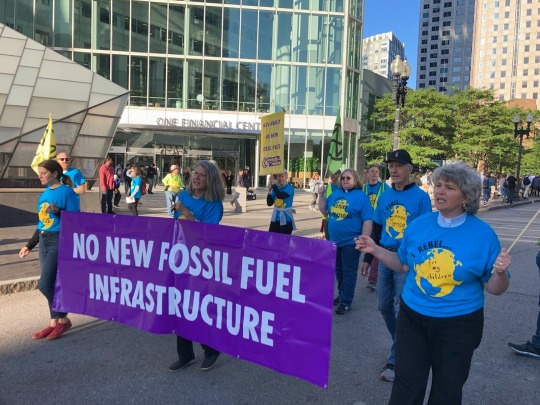
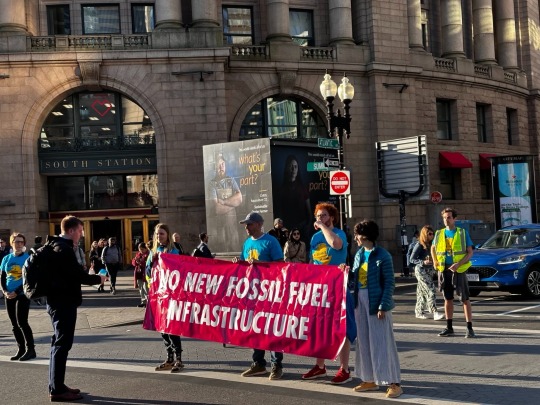
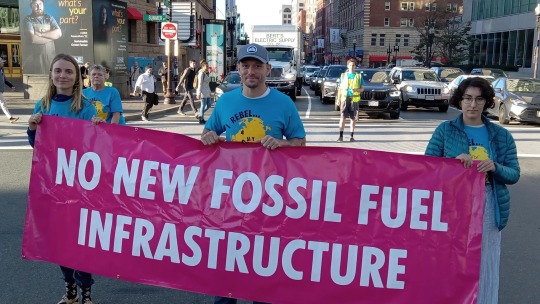




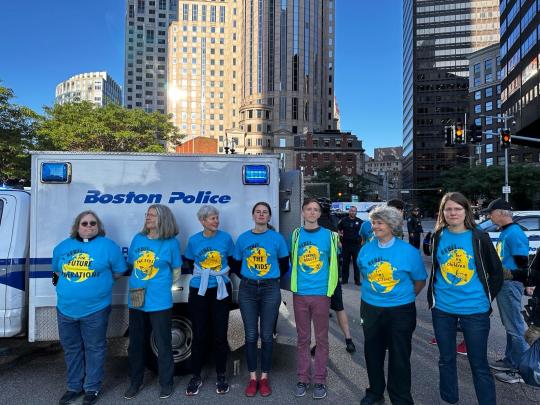

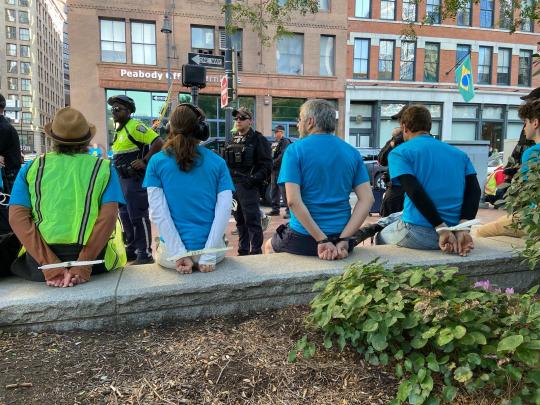

Climate Activists Disrupt Boston Rush Hour Traffic
On Thursday September 21, more than 35 climate activists from XR Boston shut down traffic around the financial district to demand that the Healey administration ban new fossil fuel infrastructure. Three independently moving groups of XR rebels marched slowly around the intersections of Atlantic Ave and Seaport Blvd., Atlantic Ave. and Summer St., and Purchase St. and Summer St. creating traffic gridlock. The activists communicated that they would refuse to end their traffic disruption unless the Governor made a public statement committing her administration to opposing all new fossil fuel infrastructure projects, including the expansion of airports and gas connections in new buildings.
The activists wore blue shirts with yellow illustrations of the Earth accompanied by slogans "I rebel for..." followed by personalized messages (my kids, a livable future, etc.). They held large banners reading "No New Fossil Fuel Infrastructure" and chanted "Governor Healey, you make the rules, time to ban new fossil fuels," "Massachusetts, don't delay, ban new fossil fuels today."
When asked why he chose to participate in non-violent civil disobedience, Monty Neill, an event organizer and one of the arrested climate activists, replied "My grandchildren are facing a world of climate and ecological collapse, with social crises inevitably following. How bad it will be depends on what we do today. An easy first step in Massachusetts is to halt fossil fuel expansion. Leaders must lead, not see what lobbyists say or fear to ‘spend their political capital.’ Governor Healey and the legislature must act now, no more delays."
Jana Pickard-Richardson, another activist with XR Boston, added "I’m risking arrest today out of love and rage. Love for the millions upon millions who stand to lose their homes, and even their lives in this worsening climate crisis. And rage at the politicians who have wasted decades with incremental actions and business as usual. And now as the signs of the crisis unfold around us, our government still is not acting with the urgency the situation demands."
Over 20 activists were arrested after blocking rush hour traffic for almost 30 minutes. In an August meeting with XR Boston, Climate Chief Hoffer admitted Massachusetts won't make its legally binding target to reduce emissions 50% by 2030, per the 2021 Act Creating A Next-Generation Roadmap for MA Climate Policy. She promised that the Healey administration would release a statement shortly. There has been no statement. We are escalating. Our lives depend on it.
Photos by Cam Lawless, Jesse Kieffer, Skip Schiel, Haley McH, Jule Manitz
#boston#extinction rebellion#civil disobedience#climate activism#xrboston#general disruption#traffic#rush hour#slow march#arrests#non-violent#week of rebellion#climate emergency#fossil fuels
11 notes
·
View notes